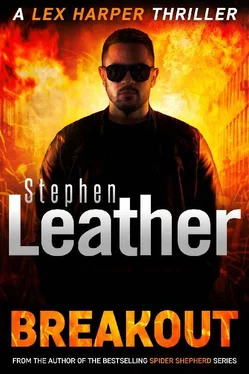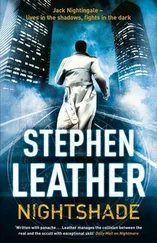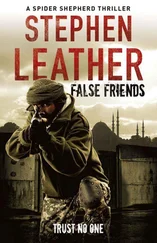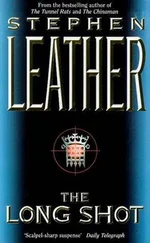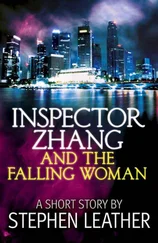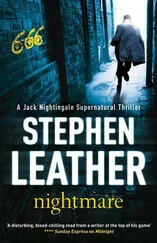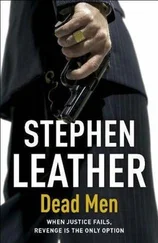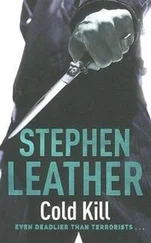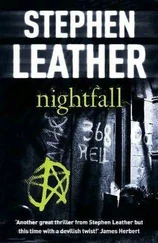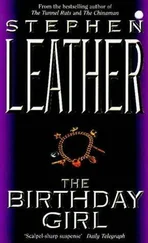BREAKOUT
A LEX HARPER THRILLER
STEPHEN LEATHER
TABLE OF CONTENTS
Author’s Note
Chapter 1
Chapter 2
Chapter 3
Chapter 4
Chapter 5
Chapter 6
Chapter 7
Chapter 8
Chapter 9
Chapter 10
Chapter 11
Chapter 12
Chapter 13
Chapter 14
Chapter 15
Chapter 16
Chapter 17
Chapter 18
Chapter 19
Chapter 20
Chapter 21
Chapter 22
Chapter 23
Chapter 24
Chapter 25
About the Author
Slow Burn
AUTHOR’S NOTE
There really is a San Pedro prison in La Paz, Bolivia and it is every bit as bizarre as Lex Harper discovers in the course of this book. It’s effectively run by the inmates with the guards largely confining themselves to manning the main gates. There are different sections within the jail, with the best of them corresponding to the affluent suburbs of the city on the outside, and the worst even more dismal than the barrios and slums where the city’s poorest inhabitants live.
Visitors, tourists and prisoners’ wives, children, girlfriends and prostitutes all come and go from San Pedro. All manner of goods are carried in and out, and traded within its walls, and there are scores of thriving businesses inside the jail, even including a cocaine factory. Bolivian politicians - one or two of whom have even spent time in San Pedro themselves - frequently announce that they will reform or close down the jail, but - up till now at least - it has never happened.
So that is the reality, but of course, this is a work of fiction, and so any similarities between the characters in this book and the actual wardens, guards or inmates, past or present, of San Pedro, are entirely coincidental.
Stephen Leather 2020
CHAPTER 1
Scouse Davies took the glass of champagne that the stewardess offered to him and settled back in his seat. He smiled to himself. He’d been doing this job for almost a year now and had flown Club Class on quite a few occasions already but he still couldn’t quite believe his luck. He’d grown up as the shit-poor kid of an unemployed single parent, living in the roughest part of Liverpool and yet, while the ordinary mortals were crammed together back in cattle class, here he was, rubbing shoulders with the rich and successful, with an armchair ride and as much expensive wine as he could drink. Best of all, it wasn’t costing him a penny, and in fact, he was actually getting paid to do it.
‘Shall I put your bag away for you, señor ?’ the stewardess said, glancing at the flight case next to his feet.
‘No thanks, I like to keep it close at hand, ’ he said, pushing it under the seat in front of him.
He glanced around as the cabin filled up. There was the usual scattering of businessmen travelling alone, a married couple who were obviously unused to turning left when they got on a plane because they were swivelling around as they took it all in and nudging each other like over-excited kids, and a very attractive Latino woman sitting across the aisle from him. When he caught her eye, she briefly returned his smile before going back to her study of the menu.
Scouse finished his drink as they rolled back and taxied out, then settled back in his seat as the pilot wound up the engines and launched the aircraft into its take-off run.
The plane stopped for a crew change in Lima and then flew on to El Alto airport in La Paz, Scouse’s destination. He left the plane and walked quickly to Customs and Immigration. It was familiar ground for Scouse, who had already made the same journey four times over the previous few months.
A few police were watching the arrival without evident interest, some wearing the green uniform of the regular police, others the sharper-looking blue uniforms of the FELCN - La Fuerza Especial de Lucha Contra el Narcotráfico - Bolivia’s anti-narcotics force. A customs officer - a senior one, from the gold braid on his sleeves and the row of medals on his chest - was scrutinising the passengers as they passed him. Scouse headed towards the passport control when the customs officer stopped him and directed him to one of the desks. ‘If you please, señor .’
Scouse saw no great cause for concern. He recognised the customs man on duty at the desk he was being sent to and had dealt with him before on previous trips, so he was sure that the man knew the form. Scouse’s flight case would remain unopened, and after a brief examination of his small back-pack, including the removal of the $500 in $100 bills that he had placed on top of his clothes when packing it in Geneva, his bags would be chalk-marked and he would be waved through.
He placed his bags on the steel table in front of the customs man and, ignoring the flight case, the man was about to open the back-pack as usual, when the senior customs officer reappeared. He walked round behind the table and shooed his subordinate away. ‘ Toma tu descanso para tomar café ahora .’
Even Scouse’s limited Spanish was enough for him to know that the junior customs man had just been told to take a break. He attempted to argue ‘ Pero señor …’ but his superior’s response was a brusque ‘ Esa es una orden. Vamos! ’
With an apologetic look at Scouse, the junior customs man turned and walked away.
The officer at once reached for the back-pack, opened it and held up the $500. ‘What is this, señor ? You realise that attempting to bribe a customs officer is a serious offence?’
‘It’s not a bribe, officer,’ Scouse said, thinking fast and still confident that he could blag his way out of any awkward situation. ‘It’s just some cash I’d left in there. I don’t like to keep all my money in my wallet in case I get mugged.’
The officer looked past Scouse and beckoned over two armed police lounging on the other side of the customs hall. They walked over and stood flanking Scouse while the officer examined the flight-case. ‘This is locked,’ he said. ‘The key, señor , if you please.’
Scouse hesitated but then handed it over, still certain that, at worst, a phone call to the office would make the problem go away. The officer opened the case. It was full of plastic packs of US banknotes. ‘How much is here, señor ?’
‘Fifty thousand American dollars.’
‘I see. Come with me please, señor .’ He nodded to the two policemen who took Scouse’s arms and frog-marched him away from the table towards a doorway set in the wall behind it.
He was marched down some steps and along a neon-lit corridor running under the floor of the terminal and taken into a windowless interview room. There was a transparent-sided toilet, where drug mules would eventually have to deposit any packages they were carrying internally, once Nature, or a laxative, had taken its course. The stench in the room suggested that it had seen recent use for that purpose. There was also a steel table, a large wooden packing crate that stood empty, its lid open and propped against the wall, and two metal chairs. There was a sick feeling in Scouse’s guts as he saw that the chairs were fitted with restraining straps and bolted to the floor. He was hustled into one of them and held there while the straps were tightened around his arms. The police then searched him, handing his passport and wallet to the senior customs officer who had settled himself on a much more comfortable, leather-seated desk chair facing him.
‘We can straighten all this out immediately, ’ Scouse said. ‘It’s all perfectly legitimate. I’m employed as a courier by a company called Risk Reduction Inc, specialising in Kidnap and Ransom negotiations. The money is a payment for the release of one of our clients currently being held by criminals here in Bolivia. If you call the Risk Reduction Inc office in Bogotá - the number is on the business cards in my wallet - they will be able to straighten this out right away.’
Читать дальше
